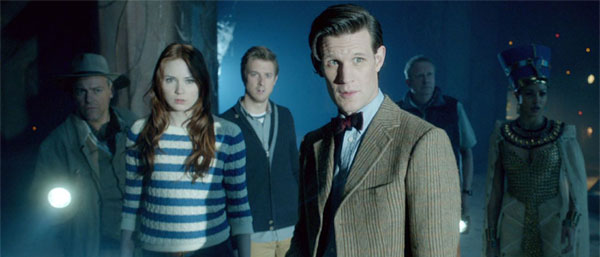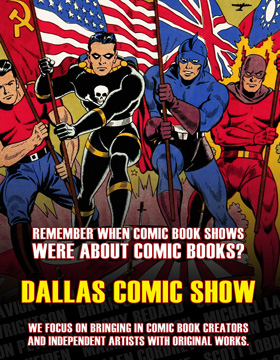His first televised adventure pre-dates STAR WARS by 14 years, and “Star Trek” by three years. He’s been portrayed by eleven different actors (none of ‘em gingers, sadly) and his mode of transportation is as unmistakeable as that of another British icon, James Bond. He’s called the Doctor, and he’ll be arriving back on television sets Saturday, September 1.
The thirty-third season of “Doctor Who,” or, if you prefer, the seventh season of the rebooted series, rolls out with “Asylum of the Daleks” on Saturday, September 1. American audiences will get it the same day as the British, and that’s a testament to the immense, fervent fanbase the sci-fi property has amassed in its current incarnation. (It’s also likely to curb piracy a bit, as the Sci-Fi Channel and BBC America used to make us Colonials wait a week to run the current episodes up until 2011. More on that in a bit.)
If the news of the show’s return hasn’t already got you giddy as a schoolgirl who just had a phone box land in her backyard, I’ll try to explain as best as possible.
The concept of the show, on the surface, is simple – as science fiction goes. An alien, from an ancient race called the Time Lords, flies around through time and space in a ship called the TARDIS, and has adventures. The show’s producers, leading up to Russell T. Davies (who helmed the show’s reboot in 2005), considered the show’s appeal to be mostly young adults and children. However, the longevity of “Doctor Who” would be limited if it was rote fantasy. There’s a few things that have made the thing stand apart, and last for almost 50 years.
There’s the whole concept of the title character, and how he’s lasted so long: he regenerates. Every time the Doctor is in mortal peril, his body heals itself, and the transformation changes his appearance. This means that, over the run of the show, eleven people have been in the title role. Same character, same memories, but slightly different personas. This way, the show soldiers on even when it’s time for the lead actor to move along. Clever move early on by the show runners, and it works.
Next, there’s the cadre of “companions” along for the ride. If it was just the Doctor saving the universe each week, it might be an okay show, but the audience needs a character they can relate to, asking the questions anyone would want to hear answered by a Time Lord. A fan’s “favorite Companion” generally coincides with when they started watching the show – I’m partial to Sarah Jane Smith, played by the lovely Elizabeth Sladen (recently deceased).
And what good would an interstellar champion be without enemies constantly trying to rub him out of the Universe? The Doctor’s faced off against some truly nefarious bad guys: his arch-enemy (and fellow Time Lord) the Master, the Cybermen, the Sontarans, the Vastha Nerada, the Silence, the Slitheen… but they all take a back seat to the experts of Extermination, the Daleks.
Finally, while the show had the reputation of the cheesiest special effects and most hackneyed “monsters-of-the-week” on most episodes through the seventies and Eighties, “Doctor Who” has benefited quite a bit from better writing and exponentially-improved budgets for effects. I’d stack the Season Six finale, “The Wedding of River Song,” up against any big-budget Hollywood outing any day of the week.
Over the last two seasons, fans have gotten very cozy with Doctor Number Eleven, Matt Smith, and his companions Karen Gillan and Arthur Darvill. (We’ll even get a look at the lives of Amy Pond and husband Rory in a series of web shorts leading up to the season premiere, called “Pond Life.”)
That’ll change in the course of Season Seven, as the Ponds are slated to break hearts in their departure, leaving us (oh, Hell, who can stay objective anymore?) to get to know a new companion played by Jenna-Louise Coleman.
I first started watching “Doctor Who” on the North Texas PBS affiliate, KERA, in the early 1980s. Most in my geberation got the exposure to the Doctor through Tom Baker’s incarnation. Back then, it was hard to explain why I loved the show so damned much. I tell most people it’s because “Who” is one of the few science fiction shows that isn’t about conquest or exploration as much as triumphing the human spirit. Sure, the Doctor complains now and again about humanity’s constant need for bailing out of dire situations… but generally, he’ll also marvel at the human capacity for resiliency, compassion, and drive to survive.
(I tell them that, but the truth of the matter is: it’s just a rollicking good sci-fi time. Can’t resist it.)
 In the last few years, the fandom for the Doctor in America has exploded.Entertainment Weekly ran a cover story on “Doctor Who” last month, the first time a British TV show has ever graces the cover. The announcement of an advance screening of “Asylum of the Daleks” in New York last week crashed Fandango within minutes of tickets coming available.
In the last few years, the fandom for the Doctor in America has exploded.Entertainment Weekly ran a cover story on “Doctor Who” last month, the first time a British TV show has ever graces the cover. The announcement of an advance screening of “Asylum of the Daleks” in New York last week crashed Fandango within minutes of tickets coming available.
I asked Adrienne Mann, British sci-fi maven, what her thoughts were on the British icon conquering America:
I’m chuffed as cherries that DW is becoming so popular in the US. I’ve been a fan since early childhood, (Jon Pertwee was “my” Doctor) and I have vague memories of Patrick Troughton’s Doctor. I also remember hiding behind my Grandad when the theme music came on.When DW was regenerated with Christopher Eccleston [the 2005 incarnation, Ninth overall] I was almost beside myself with nerd joy, and it became apparent to me very early on in that first new season that it would go down very well with US audiences (which may or may not have been [Davies]‘s intent). It just had a whole other feel to it, which was unlike anything we’d seen with DW before. It was big, loud, brash, glossy, in-your-face – and completely unlike the rather quiet, measured, oh-so-very British shows of my childhood.
If Hardwick or I can’t convince you to give the show a go, I put an open call out on Facebook to see what people had to say about the Doctor, and why they clamor for more adventures in Time and Space. My Inbox filled up fairly quickly:
It’s one of the few sci-fi properties today whose currency isn’t realism, angst or brainless spectacle, but wonder. Every episode takes me somewhere new. –Garrison Dean
I grew up in the same no nerd land as you, with even less access to television that stood up to what I was reading. And then PBS and Tom Baker saved me. – Ben H.
Always a Fan of British TV. Home sick flipping channels “The Empty Child” re-run got my interest. Was hooked after “Blink.” – Matthew D.
As a kid watching the old show on Saturdays (thank you, local PBS station), I appreciated that there was an entertaining show on weekend television that assumed that its audience could – and would – use their brains. As I got older, I started to pay attention to the characters and the mythology. It’s a show that, like much scifi, reflects its times. So while I miss the campiness of the old show (just ignore the zipper clearly visible on the enemy of the week’s costume, or that the circles on the TARDIS wall look an awful lot like paper plates…), I’m appreciative of and fascinated by how it’s risen to contemporary standards while retaining its core principles: There’s a universe to explore, and it’s full of amazing things. Pay attention to everything, because it might be important later. You can defeat an army with words; if you can’t defeat them, then you can survive an attack by ducking behind a convenient crate. And underestimate a harmless-looking woman at your peril, especially if she’s hanging out with some guy in a phone box. – Rose Auerbach
Great storylines, thoughtful but non-preachy messaging, fun actors, and some of the greatest moments in TV history — Don’t Blink! – Will Carroll
Something so iconic and distinctly British as Doctor Who? How could I not love it?! It’s the perfect marriage of my two loves: SciFi and Britishness. The brilliance of the writing and the characters engage the imagination. Every episode has you asking “Where are we going this time? Allons-y!” – Leslie H.
The Doctor gives me hope that maybe there is someone looking out for us. And he give me inspiration to do the right thing for no other reason than because it’s right. – Ellen W.
I caught some episodes on PBS late night and was hooked after that. Eccelston and those after have been ‘my Doctors’ since. – Melinda C.
As a kid, I always wondered what it would be like to travel back in time, see people, and just experience the way of life. Who matches those child imaginations, and I get to see a quirky man try not to be noticed (too much) in a blue box. – Melissa M.
I grew up with the original BBC version of the show and used to sneak in to watch it at late night on PBS in Texas. I also was incredibly lucky to have been able to travel to London as a young girl, and part of that trip included a tour of the Chiselhurst Caves, where they filmed part of the Dalek episodes. I was also the proud geek owner of some of the book series. – Katt B.
I loved reading the books when I was very little and then when we got KERA, I was instantly hooked. I felt transported to all these exciting times and adventures. Plus, I was always fascinated by the TARDIS. To a little kid, it was so cool to see it being a small police call box and yet, so huge on the inside. It was just like my imagination, it was opened to many exciting adventures….plus Tom Baker rocked the long scarf! – Chessica M.
I think the Doctor resonates with a modern audience in much the same way the original did back in the 60s and 70s. Back then, we had Vietnam, the Cold War, trades union strikes, power cuts, etc. Yes, the world was a different place in general, but the Doctor’s enemies represented the things that worried and scared us.
Plus (and I’m referring to the UK here) during the very early days of DW, we were still recovering from being battered during WWII, and in London especially. I grew up in an area that, even 20 years on from the end of the war, was still littered with evidence of the Blitz. Doctor Who gave us a new, different very special kind of hero. Not human, yet possessing all that was the very best of humanity. We needed The Doctor. And now, in the modern day, we still need him.
The Daleks (the original, relentless, unstoppable villains), the Cyberman, Silurian, the Ice Warriors… there’s a reason why they’ve been brought back with the new Doctors. They’re STILL scary, and they still represent all that we’re still afraid of. The enemy is still the enemy, except now it’s al-Qaeda, the banks, global warming, financial meltdown, blah blah… – Adrienne Mann
It appeals to the dreamer in me. Like someone else said, it is full of wonder. I love the delight and joy the Doctor takes in showing new places and things to his companions. As old as he is, he sees things for the first time through their eyes, and it reminds us to not take our own experiences for granted. The Doctor inspires humanity to be better than we are. – Rachelle H.
“Doctor Who” is the science fiction of hope. It is the triumph of romance and intelligence over brute force and cynicism. – Douglas T.
The seventh season of “Doctor Who” airs on BBC America Saturdays at 7:00 pm CT beginning September 1.









